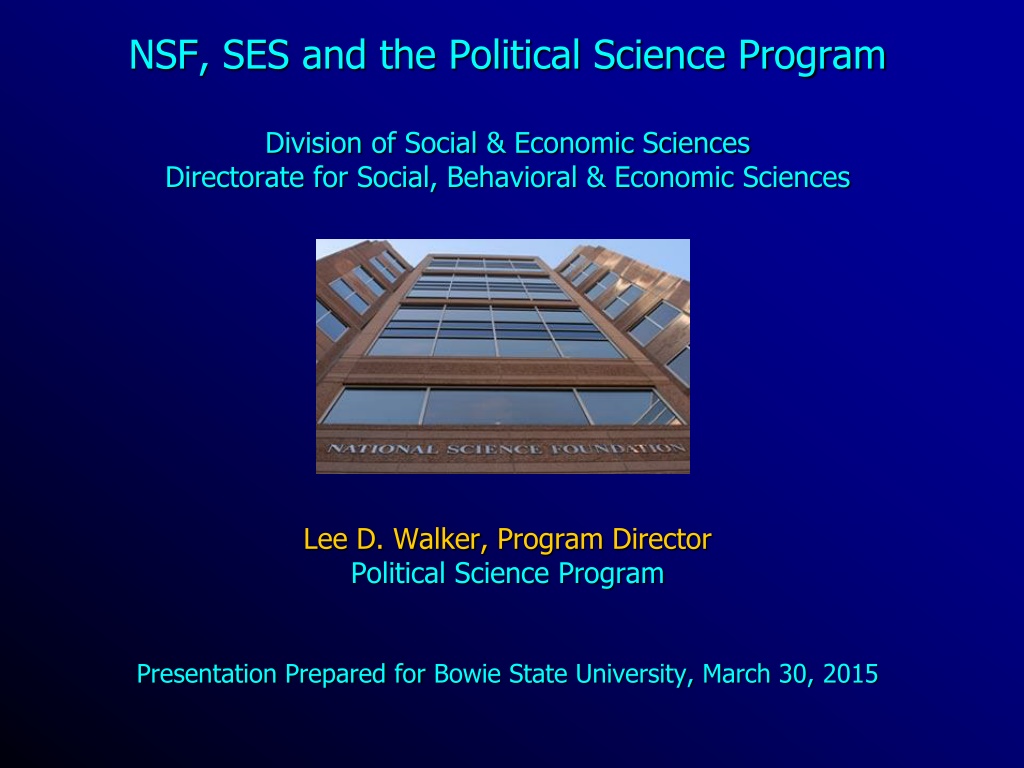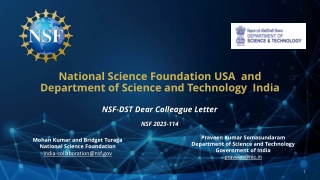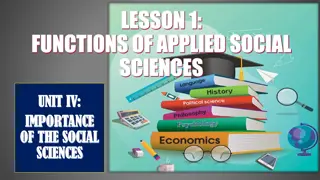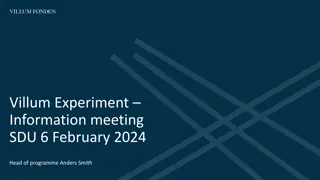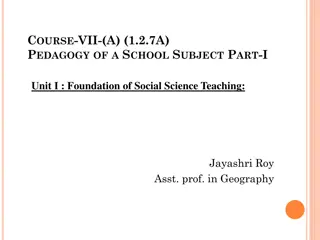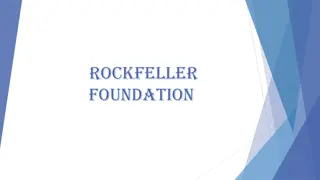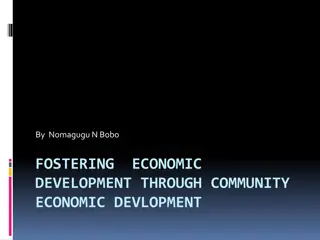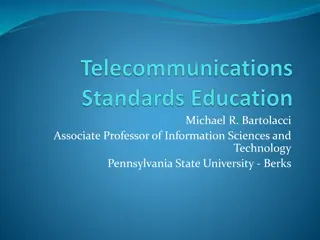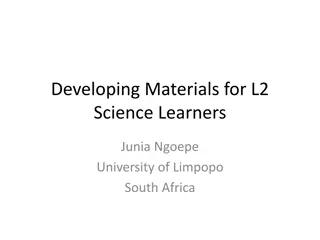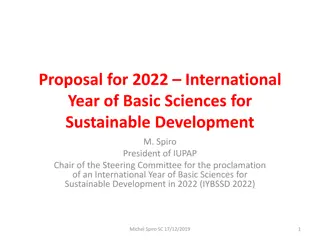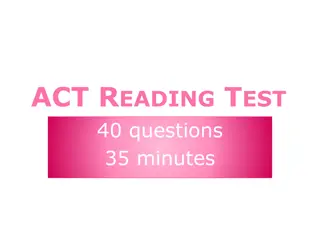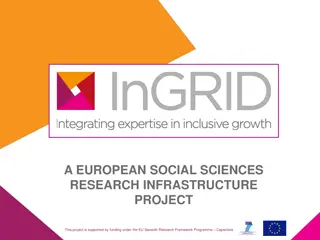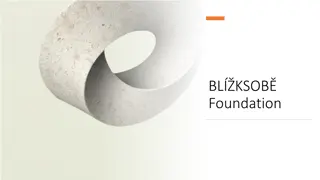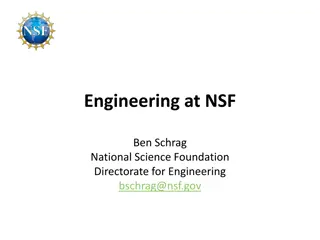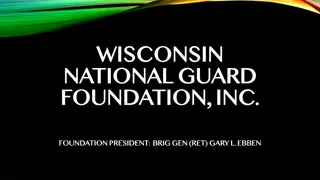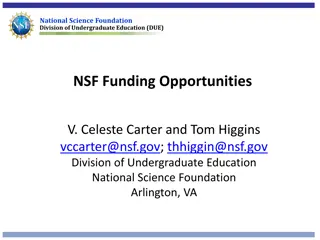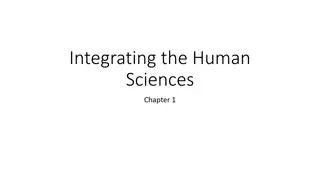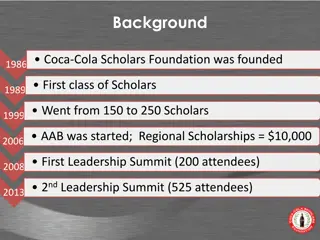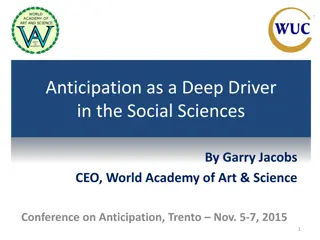Understanding the National Science Foundation's Social and Economic Sciences Programs
The National Science Foundation (NSF) supports basic research through its discipline-based structure, incorporating mechanisms like Research Experiences for Undergraduates and Minority Postdoctoral Research Fellowships. The Directorate for Social, Behavioral, and Economic Sciences houses programs such as Decision, Risk, and Management Sciences, Economics, and Political Science. The Behavioral and Cognitive Sciences Division focuses on advancing scientific knowledge about humans in various areas, including brain and behavior, language and culture, origins and evolution, and geography and the environment.
Download Presentation

Please find below an Image/Link to download the presentation.
The content on the website is provided AS IS for your information and personal use only. It may not be sold, licensed, or shared on other websites without obtaining consent from the author. Download presentation by click this link. If you encounter any issues during the download, it is possible that the publisher has removed the file from their server.
E N D
Presentation Transcript
NSF, SES and the Political Science Program Division of Social & Economic Sciences Directorate for Social, Behavioral & Economic Sciences Lee D. Walker, Program Director Political Science Program Presentation Prepared for Bowie State University, March 30, 2015
The National Science Foundation: Is an independent agency. Supports basic research. Relies on the grant mechanism. Has a discipline-based structure. Incorporates cross-disciplinary mechanisms: Research Experiences for Undergraduates; Minority Postdoctoral Research Fellowships.
National Science Foundation Director National Science Board Deputy Director Inspector General Staff Offices Computer & Information Science & Engineering Mathematics & Physical Sciences Biological Sciences Engineering Geosciences Social, Behavioral & Economic Sciences Budget, Finance & Award Management Information Resource Management Education & Human Resources
Directorate for Social, Behavioral & Economic Sciences Social & Economic Sciences Behavioral & Cognitive Sciences Science Resource Statistics
SOCIAL AND ECONOMIC SCIENCES DIVISION (SES) Seeks to enhance our understanding of human, social and organizational behavior by building social science infrastructure and by developing social disciplinary and interdisciplinary research projects that advance knowledge in the social and economic sciences.
Social & Economic Sciences Programs Decision, Risk & Management Sciences Economics Science of Organization Law & Social Science Methodology, Measurement & Statistics Political Science Science, Technology & Society Sociology
BEHAVIORAL AND COGNITIVE SCIENCES DIVISON (BCS) supports research to develop and advance scientific knowledge about humans spanning areas of inquiry including brain and behavior, language and culture, origins and evolution, and geography and the environment.
Behavioral & Cognitive Sciences Programs Archaeology & Archaeometry Cultural Anthropology Cognitive Neuroscience Developmental & Learning Sciences Geography & Spatial Science Linguistics Perception, Action, & Cognition Physical Anthropology Social Psychology
Popular Modes of Support in the SES Programs There are many modes of support, including Dissertation Research Improvement Grants Faculty Early Career Development Awards Standard Research Grants Regular Collaborative Workshop Awards Research Experience for Undergraduates RAPID EAGER Division of Social and Economic Sciences
Doctoral Dissertation Improvement Grants Archaeology Cultural Anthropology Decision, Risk & Management Science Economics Geography & Regional Science Law & Social Sciences Linguistics Physical Anthropology Political Science Science, Technology & Society Sociology
Faculty Early Career Development (CAREER) Program Untenured faculty (or comparable) Single scholar award $500,000+, 5-years minimum award Lifetime limit of three proposals Target date is same as standard program dates
EAGER Exploratory work on untested, potentially transformative ideas High-risk, high-potential payoff $300,000 maximum; 2 years Eight page description Internal review required; external optional Contact Program Director first EAGERs are exceptions, not the rule!
Rapid Response Research (RAPID) Research when data are ephemeral $200,000 maximum; one-year duration Contact program officer first
Research Experiences for Undergraduates (REU) Available in all programs Two types of awards - REU Supplements: Awards added onto senior awards to sponsor undergraduate student research - REU Sites: training programs, often in the summer months, for teaching research methods to undergrads
WHERE TO START WITH WRITING A PROPOSAL? A basic science idea Research questions/ hypotheses Check awards by program, keyword, etc. (ww.nsf.gov/awardsearch/) Read solicitation carefully! Ensure alignment of the project s content, scale and budget to the targeted NSF program Become familiar with NSF s review criteria and submission rules Become familiar with the NSF Grant Proposal Guide (GPG) http://www.nsf.gov/publications/pub_summ.jsp?ods_key=gpg
NSF SUPPORTS BASIC RESEARCH Proposed work should be grounded in a broader theoretical framework Should focus on one or a few questions/hypotheses grounded in that broader framework Uses scientifically sound approaches to test hypotheses/answer questions Focused results also contribute to enhancement of broader theoretical knowledge
CRAFTING A PROPOSAL CONTINUED Select appropriate methodology and measurement to answer questions or test hypotheses Analysis of data Answer the questions and/or test hypotheses New information and contributions to theories and literatures
PROPOSAL TIPS Make project titles short and simple (declarative statement; avoid cute) Give yourself plenty of time Do not expect to be successful by throwing something together at the last minute Consider theoretical foundations and prospective theoretical contributions Learn how proposals will be evaluated; think like those who will review and make decisions Volunteer to review proposals Provide suggested reviewers ( single copy documents )
BE SURE TO BE PAY ATTENTION TO Data Management Plan All proposals must describe plans for data management and sharing Plan is reviewed as part of the intellectual merit or broader impacts Postdoctoral Mentoring Plan If requesting money for a postdoc, must have plan as supplementary document IRB (human subjects) or IACUC (vertebrate animals) Clearance No award involving human subjects can be made without IRB approval or exemption; studies involving vertebrate animals require IACUC approval prior to award This approval is not needed at the time of proposal submission; may be pending
BUDGET TIPS Amounts Reasonable for work Be realistic Well justified Provide basis for estimates In-line with program guidelines Examples of Eligible Costs Personnel Equipment Travel Other Direct Costs, Subawards
ADVICE Sign up for NSF Updates by Email on NSF homepage Team up Collaborate Ask colleagues to comment on proposals Email Program Director with specific questions, one-page prospectus Read http://chronicle.com/article/What-to-Say-and-Not- Say-to/131282/ Learn to get beyond rejection
What Is Intellectual Merit? How important is the proposed activity to advancing knowledge and understanding within its own field or across different fields? How well qualified is the proposer to conduct the project? To what extent does the proposed activity suggest and explore creative, original, or potentially transformative concepts? How well conceived and organized is the proposed activity?
What Are Broader Impacts? How well does the activity advance discovery and understanding while promoting teaching, training, and learning? How well does the proposed activity broaden the participation of underrepresented groups (e.g., gender, ethnicity, disability, geographic, etc.)? Will the results be disseminated broadly to enhance scientific and technological understanding? What may be the benefits of the proposed activity to society?
PROPOSAL PROCESS & TIMELINE Minimum of three reviews required Ad hoc NSF Proposal Generating Document Award via DGA Program Officer Analysis & Recommendation Division Director Concur Organization submits via FastLane Panel Proposal Processing Unit Both Decline NSF Program Officer Returned as Inappropriate/ Withdrawn Research & Education Communities 90 Days Proposal Preparation Time Organization Div. Dir. Concur Award Proposal received by NSF 6 months 30 days PO Recommend Review of Proposal DGA Review & Processing of Award
Declinations Trust me Relies on PI reputation alone Unclear connection between question to be investigated and research activities outlined in proposal Insufficient detail regarding research design Not feasible Gaps in expertise Insufficient funding Overly ambitious Incremental or unclear contribution
Utility of Submitting (Even If Not Funded) Forces careful thinking Provides useful information in reviews and panel summaries to strengthen research May inspire revision and resubmission
Political Science Program Target Dates: January 15th & August 15th Supports qualitative and quantitative work across multiple subfields, including American politics, international relations, comparative politics, political behavior, political economy, political institutions Funds regular, dissertation improvement, workshop, CAREER, RAPID, & EAGER proposals.
QUESTIONS? Contacts: Political Science Brian Humes 703.292.7284 bhumes@nsf.gov Lee Walker 703.292.7318 lwalker@nsf.gov
